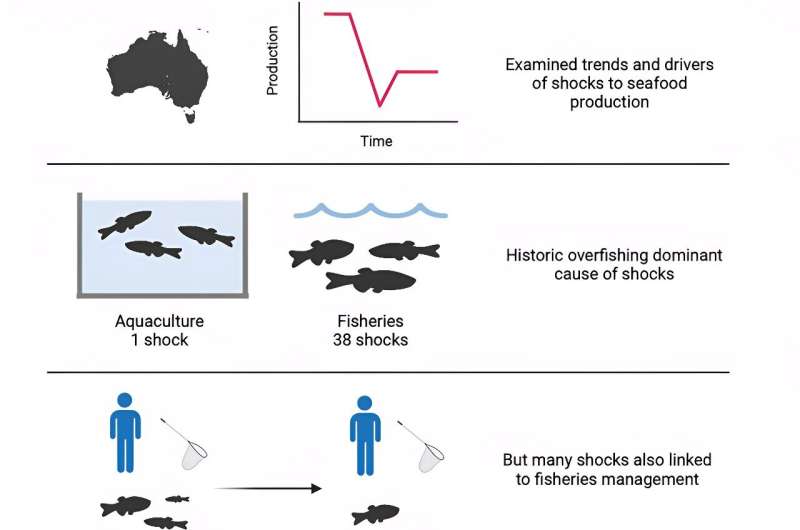This article has been reviewed according to Science X's editorial process and policies. Editors have highlighted the following attributes while ensuring the content's credibility:
fact-checked
trusted source
proofread
Better management of the Australian seafood industry can create resilience to food shocks

New research from the University of South Australia shows that the Australian seafood industry has become more resilient to food shocks—a good sign, with Australians eating more seafood now than ever before.
Shocks are a sudden and dramatic loss in food production and can impact food security, as well as local industries and livelihoods.
Maintaining shock-resilient food systems is a priority for many nations and responding to and learning from shock events may be the key to building this resilience, according to UniSA marine ecologist Dr. Zoe Doubleday, lead author of a new paper.
The paper, published in the journal Cell Reports Sustainability, found that Australia's growing aquaculture sector was relatively robust to shocks, while wild caught fisheries had become more resilient to shocks in recent years.
The decline in shocks aligns with a period of major reform in fisheries during the mid-2000s, when three major policy initiatives were implemented, including a marine-protected area network and harvest strategy policy.
Nearly half of the shocks identified were linked to historic overfishing, with a third implicated with management change, which was often introduced in response to stock decline and resulted in more sustainable practices.
The fishery policies that addressed overfishing could be behind the absence of shocks in recent years, the paper states.
Dr. Doubleday, an Australian Research Center Future Fellow, says the findings suggest that investment in fisheries management has bolstered system resilience in recent years.
"The Australian government has been responsive to declines in production, contributing to fewer shocks and building a more resilient, sustainable food system," she says.
Other shock drivers included disease, economic reasons, declines in biomass or recruitment, habitat degradation, and extreme weather events, several of which may be caused by the impact of climate change.
Dr. Doubleday says it's important to prioritize responsive fisheries management as the threat of climate change worsens.
"Given we know that global climate volatility will likely increase, it will be important to understand the vulnerabilities in the system and act on this information with policy and management changes to help stabilize food production locally," she says.
"Seafood is a critical source of healthy protein and micronutrients, and ensuring the stability and sustainability of its production will ensure the growing demand for seafood is always met."
More information: Zoë A. Doubleday et al, Improved fisheries management and aquaculture growth align with fewer shocks to Australian seafood production, Cell Reports Sustainability (2024). DOI: 10.1016/j.crsus.2024.100131
Provided by University of South Australia




















